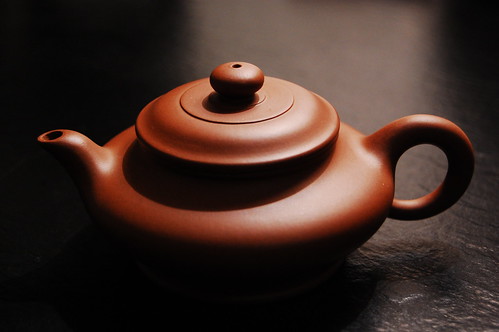
The tea hails from Li shan, or Pear Mountain, in Taichung County, Taiwan. Lishan can also refer to the mountainous range around Pear mountain. The mountain is named after the numerous pear orchards which used to be the mainstay of the mountain, but currently, the region is famous for its tea. The tea here is grown at an elevation of 1600-2600m.[1]
Here's the story behind this Li shan black tea. Summer harvests in this area tend to create astringent teas, so many farmers don't bother with a summer harvest production. This farmer had something else in mind. Thinking the astringency would affect a black tea less, he decided to try his hand at producing a special quality black tea. This black tea is made from the same bushes that will be producing jade oolong in the winter, and it was picked and processed exclusively by the same man.
The leaf is of top grade, very long and full, and the leaves sport a tough hide. Big long twigs accompany the leaf with their golden color. Having the giant leaves means that more leaf needs to be used to get a thick flavor. I added a good amount, then went on to brew the tea in the usual black tea fashion (212°f - 3-5min). I noticed about a minute into the steep that aroma was radiating from the gaiwan, a tell-sign that a steep is complete. After this, I switched my prep to gongfu-style.

The notes on the tea punch out as follows: Aroma is complex for a black. There's the upfront deep sweet notes, but there's also complexity hiding as notes of honey and some fruit (like Darjeeling terroir). A light mouthfeel gives the illusion of an understeeped tea, but a viscous and sweet character provide contradictory signals. The flavor is indeed complex, like the aroma. Up front there's some of your usual black tea notes, but complexity is added by a fruit character (think Darjeeling, Nilgiri), honey, and a sweet huigan; honey and fruit return in the aftertaste and afteraroma. After a few cups, a drying mouth is noticed. This complex tea lends itself to more than 5 more infusions.
 The spent leaves have a virescence to them (hard to capture on film)... A true black tea shouldn't look like this. I remember Josh was telling me something about incomplete oxidation, though I dismissed it as I thought he was referring to the golden twigs. When buds and twigs get fully oxidized, they turn gold. When leaves get fully oxidized, they turn black. Well, I guess he was right. The greener leaves would mean incomplete oxidation, and this would in turn account for the added complexity I was describing, as well as the hardy durability.
The spent leaves have a virescence to them (hard to capture on film)... A true black tea shouldn't look like this. I remember Josh was telling me something about incomplete oxidation, though I dismissed it as I thought he was referring to the golden twigs. When buds and twigs get fully oxidized, they turn gold. When leaves get fully oxidized, they turn black. Well, I guess he was right. The greener leaves would mean incomplete oxidation, and this would in turn account for the added complexity I was describing, as well as the hardy durability.
Summary: I love it. It's a rare-production Taiwanese black tea with oolong characteristics, good complexity, and surprising longevity (for a black tea). In retrospect, it reminds me of Glendale Estate Nilgiri, but with much more to offer. It's not on J-Tea's website, but if you contact Josh, I'm sure an order can easily be arranged.


3 comments:
I have not tried Josh,s Taiwan Black but I have had Hou De,s. Honestly I thought the stuff was nasty. I love Hou De but with this one I almost wanted to return it. It had some of the sweetness and flavors found in a Taiwan Oolong but also an obnoxious smell and taste similar to burnt coconut.
I had the complete opposite reaction to Hou De's black. I absolutely love the aroma and flavor of this tea. Unrepentantly sweet and malty, with a heavy-metal rather than classical complexity.
I'd be so much more than happy to take that tea off your hands!
-shah8
I just got into oolong. Im having a big red robe right now. Im interested to trying this black tea with an oolong twist.
Post a Comment